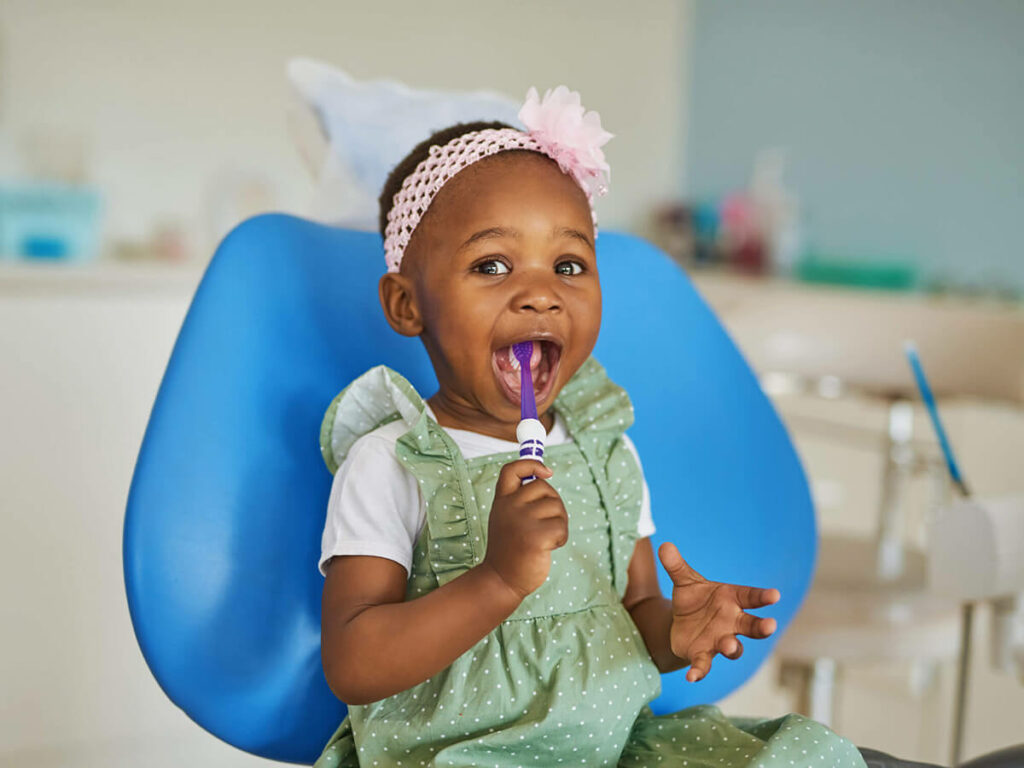Pediatric Dentistry
Providing young smiles with gentle, pediatric dentistry in Scottsbluff, NE, to build the foundation for a lifetime of healthy teeth.
Scottsbluff Pediatric Dentistry
At Platte Valley Dental Group, we specialize in pediatric dentistry because we believe every child deserves a bright, healthy smile. Our dedicated team provides a warm, friendly environment that makes dental visits a positive experience for children and parents alike. From routine check-ups to preventive education, we equip your little ones with the habits they need for oral health success. We ensure every visit is comfortable, informative, and fun for your child—call today to set up your child’s next visit with our office!

-
What are the common issues of dental health in children?
Dental issues in children should be addressed as soon as possible to create a healthy smile throughout their life. Below are some of the common issues we help treat:
- Tooth Decay (Cavities): The most common childhood disease, often caused by sugary foods and poor dental hygiene.
- Gum Disease: Inflammation of the gum tissue, which can lead to more serious infections if untreated.
- Enamel Erosion: Loss of enamel due to acidic foods and drinks, leading to sensitivity and decay.
- Thumb Sucking and Pacifier Use: Can lead to misaligned teeth and bite problems if prolonged.
- Teething Pain: Discomfort as new teeth emerge, often leading to irritability and biting.
- Early Tooth Loss: Caused by decay or injury, potentially affecting the alignment of permanent teeth.
- Orthodontic Problems: Misaligned teeth and jaws, requiring early assessment and possibly intervention.
We work to educate parents and children on these issues and provide preventive care for infants, children, and teens. Schedule today!
-
How should I care for my baby's teeth?
Caring for your baby’s teeth is crucial for their overall health and development. Below are some of our recommendations on how to care for your child’s teeth.
- Before Teeth Emerge: Clean your baby’s gums with a soft, damp cloth twice a day, especially after feedings and before bedtime. This helps remove harmful bacteria.
- First Tooth Appearance: Start brushing with a soft-bristled baby toothbrush and a tiny smear (the size of a grain of rice) of fluoride toothpaste twice a day as soon as the first tooth appears.
- Fluoride Toothpaste: Use fluoride toothpaste from the first tooth; fluoride is essential for preventing tooth decay. Increase to a pea-sized amount for children aged 3 and older.
- Brushing Technique: Gently brush with circular motions, covering all surfaces of the teeth and the gum line. Help your child with brushing until your they can rinse and spit without assistance, usually around age 6.
- Diet and Oral Health: Limit sugary drinks and snacks. Encourage water and healthy snacks like fruits, vegetables, and cheese, which help clean teeth and reduce the risk of decay.
- First Dental Visit: Schedule the first dental visit by your baby’s first birthday or after the first tooth appears. Regular dental visits are key to early detection and prevention of dental problems.
- Nighttime Routine: Don’t put your baby to bed with a bottle of milk, formula, juice, or sweetened liquid. These can linger in the mouth and cause tooth decay.
- Teething Comfort: Give your baby a clean teething ring or cold, wet washcloth to chew on to soothe discomfort. Avoid teething biscuits—they contain sugar and can lead to cavities.
Implementing these practices early on can help ensure your baby develops healthy teeth and good oral habits for life.
-
What is pulp therapy?
If your child complains of sensitivity or constant pain or if the tissue around a tooth is swollen and painful, they may have pulp damage. Pulp damage can occur due to trauma, decay, or other infections. The term’ pulp’ refers to the live part of the tooth.
It is important to preserve as much of the living pulp as possible while treating the infection or removing any damaged sections. A pulpotomy is one way to achieve this. A pulpectomy, often called a ‘baby root canal,’ is a dental procedure performed on children to treat and preserve a severely decayed or infected primary (baby) tooth.
We understand that having your child undergo this procedure can be concerning. Rest assured, we will do everything possible to ensure their comfort and well-being. We will carefully remove decay and fill the space, just like in an adult root canal. Then, we will place a crown to help with spacing until the adult tooth is ready to come in. By saving the pulp, we give your child the best chance of producing a healthy adult tooth.
Pediatric Dentistry Questions?
If you have more questions about pediatric dental care, please contact our office and we will be happy to discuss further.

